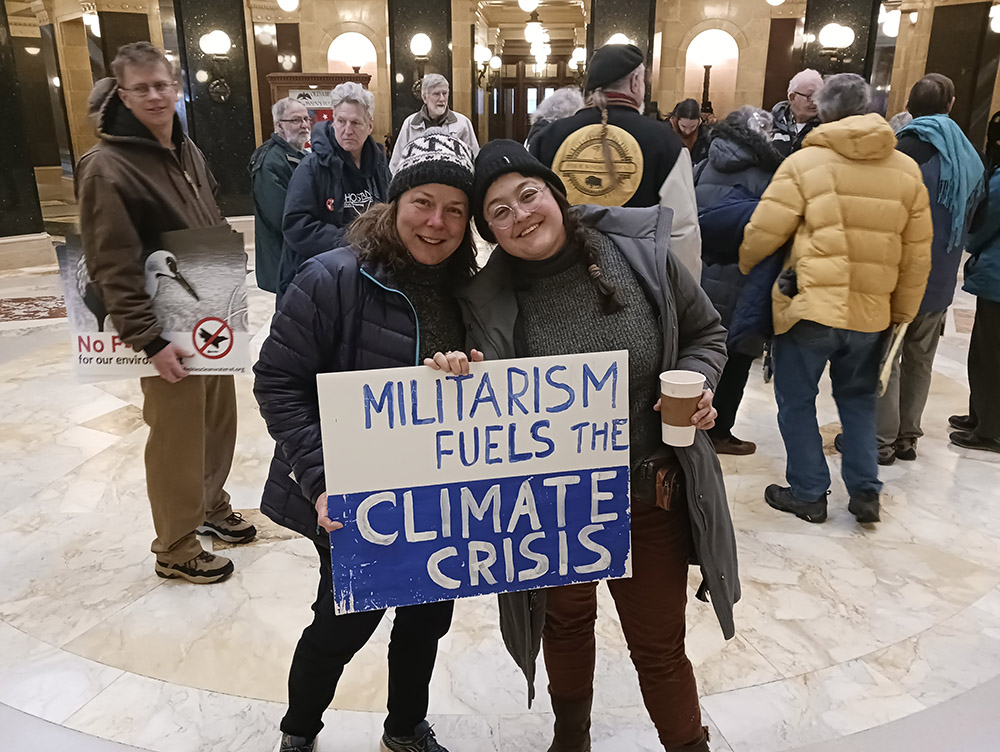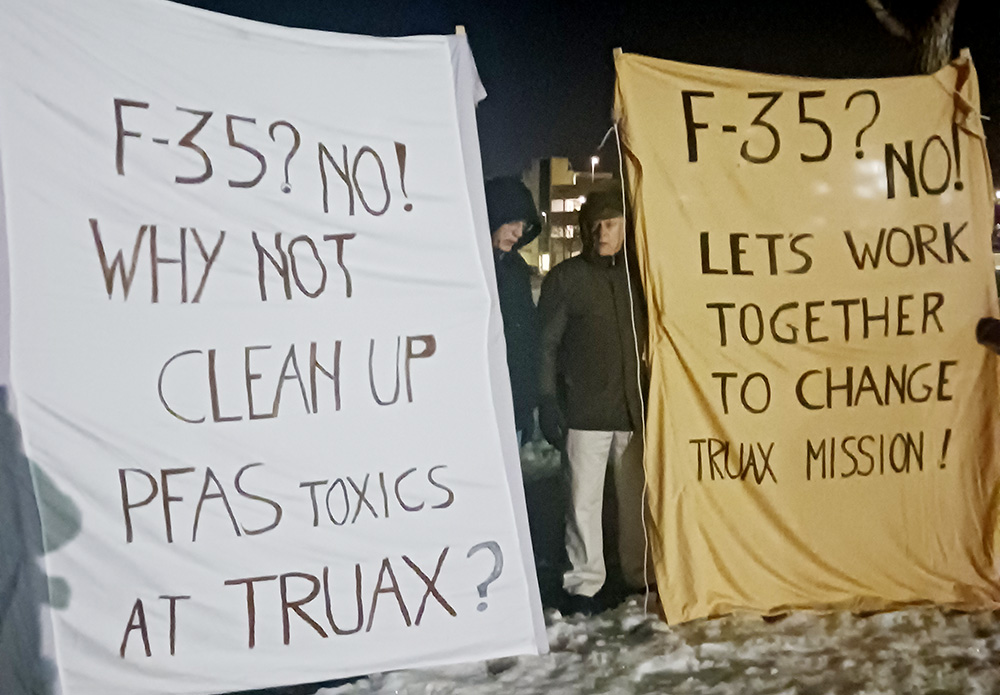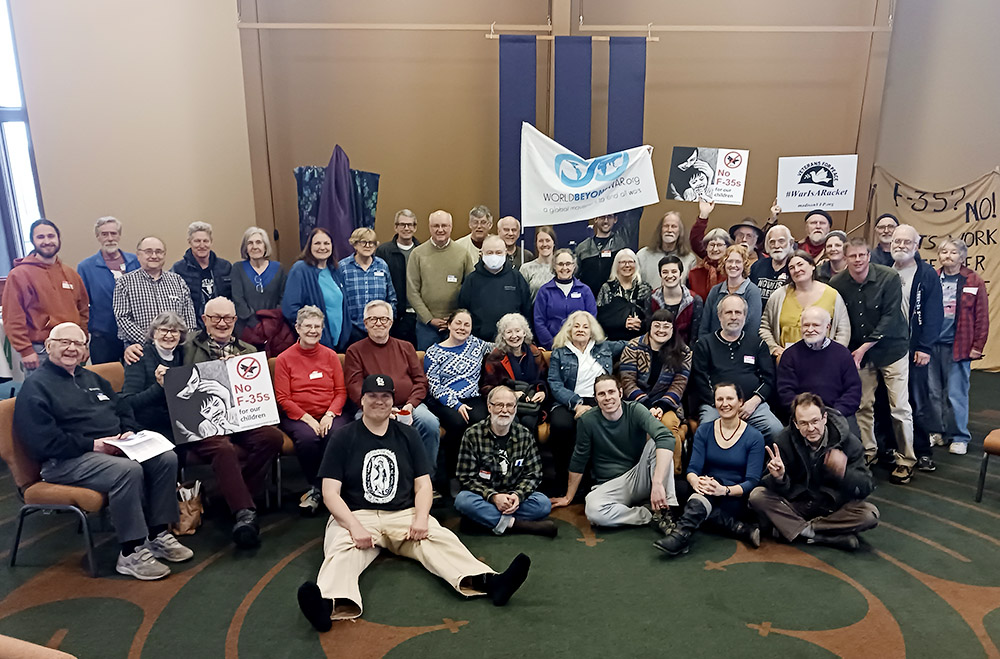
Chrissy Kirchhoefer, left, and Lindsey Myers, St. Louis-area Catholic Workers, hold a sign during a witness in the Wisconsin State Capitol in Madison on March 27. (NCR photo/Theodore Kayser)
March 19, the Feast of St. Joseph — patron of fathers, immigrants and craftsmen — marked 20 years since the United States waged its brutal "shock and awe" attack on the lives and homes of Iraqi people — among them fathers, immigrants and craftsmen.
The following weekend, Catholic Workers from around the Midwest — from Cleveland to Duluth, Minnesota, to Kansas City, Kansas — gathered for the first time since the start of the pandemic in Madison, Wisconsin, for their annual Faith and Resistance Retreat, originally begun during that fateful spring in 2003.
Having been a member of the movement started by Dorothy Day and Peter Maurin for most of my adult life, I had been looking forward to participating in the reemergence of what had become a sort of sacred ritual: longtime Catholic Workers initiating newcomers into the tradition and practice of civil disobedience.
Our group was hosted by many local activists — Catholic Workers among them — who had been steadfast for years in their opposition to the U.S. Air Force's plan to base a fleet of F-35 fighter jets at Truax Field Air National Guard Base in Madison. The jets, which are built with the capacity to carry nuclear warheads up to four times more powerful than the bombs that destroyed Hiroshima and Nagasaki, Japan, are planned to arrive in Madison this May.
We were there to say no to F-35s in Madison or elsewhere, and no to U.S. militarism anywhere.

Participants in the Midwest Catholic Worker Faith and Resistance retreat hold up signs protesting the F-35 fighter jet outside Truax Field Air National Guard Base northeast of Madison, Wisconsin, on March 27. (NCR photo/Theodore Kayser)
Despite a foot of snow that weekend, about 110 people participated in the gathering, which culminated on March 27 with direct actions both at Truax Field and at the State Capitol building.
The weekend began festively, as friends old and new greeted one another with hugs and shrieks of joy as we feasted on good food grown by Catholic Worker farms or gathered and cooked by members of local church communities.
We worshipped together at a traditional Sunday Mass. We worshipped, too, at an outdoor "Wild Church," engaging in a litany of gratitude for the signs of spring, connecting the early stirrings of life in the Earth to those in Mary's womb at the Annunciation.
Our days together were filled with song, the lyrics grounding us together in purpose: "May this body be a bridge for the healing of this land"; "Gathered here in one strong body, Spirit draw near"; "When justice rolls down like mighty waters, what a day that day will be."
The Madison community skillfully organized a multitude of opportunities for us to learn about the dangers of the F-35s. Vicki Berenson and Steven Klafka of Safe Skies Clean Water Wisconsin spoke of the racial, social and economic injustice inherent in stationing these noise-polluting jets near schools disproportionately attended by low-income and Black and brown children.
They pointed out the disastrous environmental impact each jet will have. (The CO2 emissions of one jet are equivalent to adding an additional 4,248 passenger vehicles onto roads.)
Advertisement
Brian Terrell of Strangers and Guests Catholic Worker Farm spoke to his resistance experience at the nuclear sharing bases in Europe also set to receive F-35s soon, and provided context for the history of Catholic Worker nonviolent resistance to militarism.
Kathy Kelly — longtime peace activist, author and founder of Voices in the Wilderness — spoke of the human cost of U.S. military aggression, for which the F-35s are built. Kelly has spent years traveling to and building relationships in Iraq and Afghanistan, even choosing to remain in combat zones during the early days of both U.S.-Iraq wars.
Laying bare the myth that weaponry like the F-35s are a tool of defense, Kelly recounted her experience of the 2015 bombing of a hospital in Kunduz, Afghanistan, by a U.S. gunship that killed dozens of staff members and patients. According to Médecins Sans Frontières, who ran the facility, the U.S. had previously been informed of the hospital's precise location, and the attack continued on for 30 minutes after staff members had called the U.S. military in desperation, begging them to stop.
Given the seriousness of the cause we were there to protest — nuclear annihilation and environmental destruction — I was dismayed at the lack of attendance by young people. Only about 10 of us identified as "under 50." This in stark contrast to the 2017 Chicago Faith and Resistance Retreat focused on racism, at which the vast majority of participants were under 40.
We lamented the seeming generational divide that has emerged in the Catholic Worker movement over the past decade between those of us who show up to protest war and militarism (largely elders), and those who show up to combat racism and climate change (overwhelmingly youth), and wondered how we might better emphasize the intersectionality of these evils.

Participants in the Midwest Catholic Worker Faith and Resistance Retreat, held in Madison, Wisconsin, the last weekend in March, pose for a group photo. (NCR photo/Theodore Kayser)
Danaka Katovich, national co-director of CODEPINK Women for Peace and in her early 20s, bucked this trend. Katovich, who has been working since 2018 toward ending U.S. participation in the war in Yemen, pointed out the clear connection between the racism undergirding the U.S. military's assault on the Middle East and the ecological destruction inflicted by these weapons.
Katovich and the youth cohort she facilitates understand imperialism to be the thread that weaves together militarism, racism and climate chaos. They work to pressure large cities and other corporations to divest from weapons manufacturers like Raytheon and Boeing. (On Monday morning, Katovich and her three Gen-Z colleagues — all dressed in pink — dropped a huge banner both in the Capitol building and over a bridge that read, "Feminists Say No to War!")
At 5:30 a.m. on March 27, more than 40 activists — Catholic priests among them — successfully blocked the shift change outside Truax Air National Guard Base in protest of the F-35s. A few hours later, dozens of people gathered at the State Capitol to call on Wisconsin Gov. Tony Evers to change the mission of Truax.
Our fliers read, "The F-35, wherever it is deployed, will degrade the environment, intensify climate chaos, and intensify the horrors of wars and precipitate new ones. ... We call upon world leaders to disarm and abolish war."
While several Catholic Workers and friends risked arrest, no one was detained during either protest. After lunch, many returned home to continue providing hospitality to the poor, stewarding the land, and resisting injustice in their local communities. While the weekend's events alone may not have stopped the F-35s, I pray that they contributed to a growing movement to end warfare.







